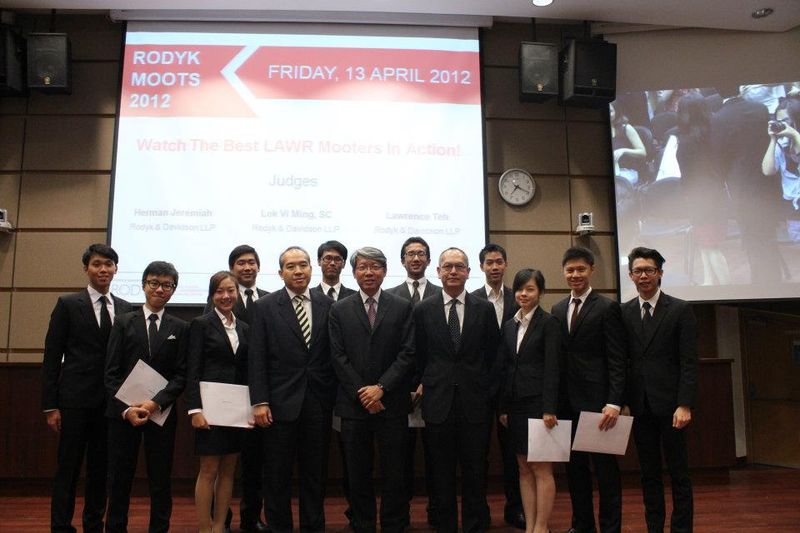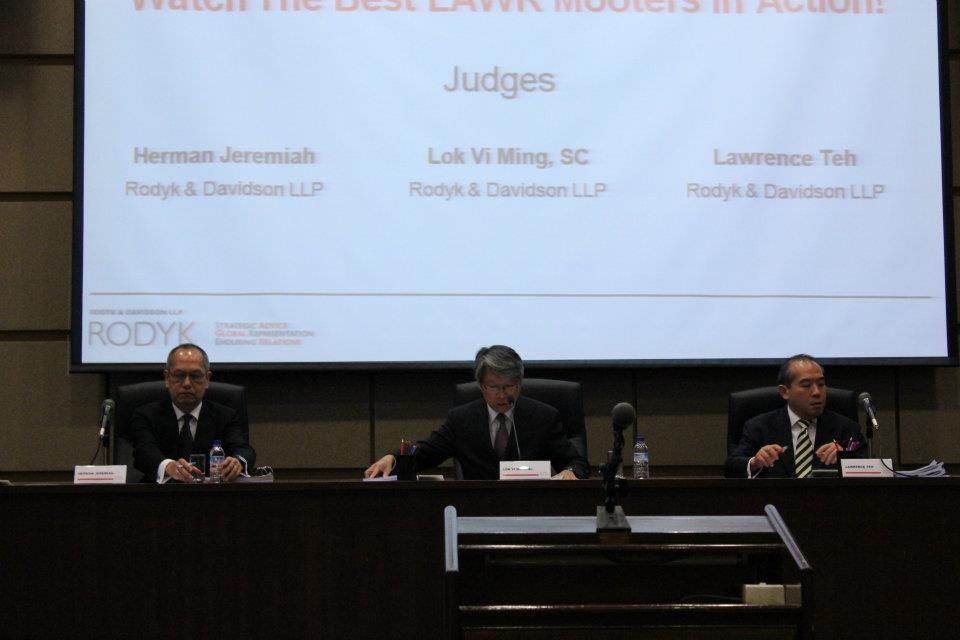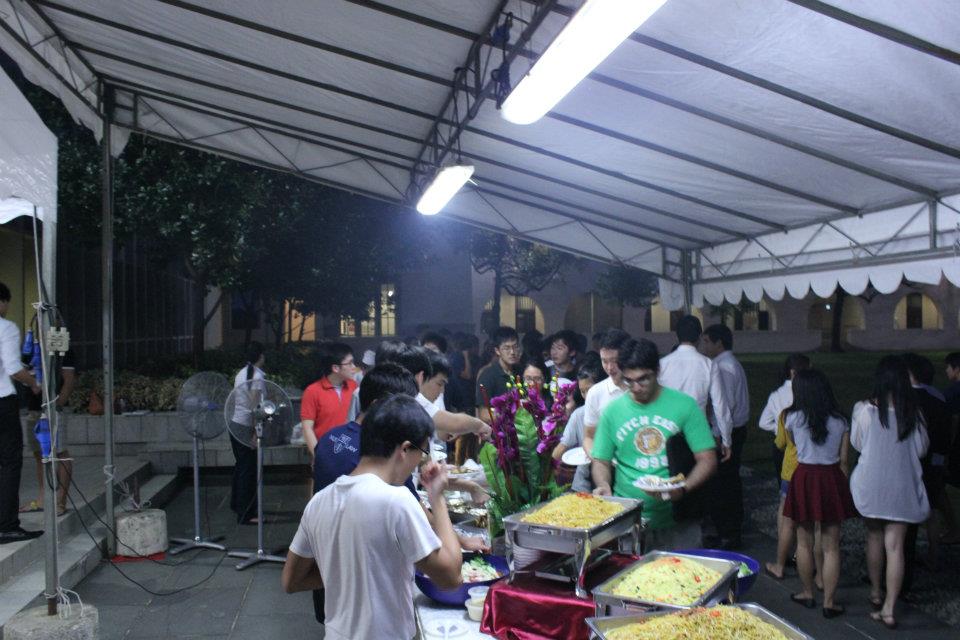Mention LAWR to a freshie and chances are you’ll receive a frustrated groan and a roll of the eyes as he goes on to complain about the upcoming submission and how he is nowhere near the word limit. But perhaps to some, all the sleepless nights spent poring over Hansard and cases became worthwhile when the chance of winning $1000, an internship at Rodyk & Davidson LLP and the bragging rights of being the top LAWR mooters materialized at the 2012 Rodyk Moots.
The 2012 Rodyk Moots mark the end of NUS Law’s arduous and challenging Legal Analysis, Writing and Research program, otherwise affectionately known as LAWR(GHH!!!), which pits the year’s top 10 best LAWR mooters against one another for fame and fortune. 2 mooters were selected from each LAWR issue and could represent either the appellant or respondent on either the statutory or common law. Each presentation was 10 minutes long with no rebuttals.
This year, partners from Rodyk & Davidson LLP, Mr Herman Jeremiah, Senior Counsel Lok Vi Ming, and Mr Lawrence Teh formed the bench. Our learned friends quickly came under fire from a barrage of incisive and brutally difficult questions that sought to undermine their case theories and tested their understanding of the Law:
“Is Parliament’s intention static?”
“Can Parliament intend for their intention to change?”
“So you think an extension of the rule is not a good idea because it does not agree with your client’s case?”
“Why should we adopt the English judges’ interpretation of an English statute? Could it be informed by the context of more complicated welfare policies?”
“Yes that answers the question intellectually but not as a matter of fairness.”
The mooters valiantly stood their ground, convicted of the strength of their case theories, and justified their cogent responses with copious references to authorities and advanced persuasive policy reasons. One even made sure to check if he “sufficiently satisfied” the judges — a confidence that went above and beyond simply pleasing the court.
For 3 hours, the judges considered a constant stream of humble pleas to overrule or uphold the trial judgment, to find that a duty of care was or was not owed, to purposively interpret statues or be satisfied with the plain meaning, to find that a claim in loss of chance should not even be considered and that the relevant test of causation had not been satisfied.
Yet, there could only be one winner, a decision that the judges noted was one that could not be simply decided in the 15 minutes allotted to them for deliberation. The judges came away thoroughly impressed by the caliber of the mooters in the quality of their advocacy, presentation and disposition, praising the thoroughness in the understanding of the factual and legal issues before the court. They were also generous enough to dispense some valuable and insightful comments:
“There is a fine line between creativity in arguments and integrity before the courts.”
“Trust is very important — the tribunal needs to feel that they can trust you when you say something; they should not feel suspicious that you’re trying to pull a fast one.”
“When you stand up, part of that is your reputation to the court and your believability… When it comes to advocacy, an officer of the court has real meaning.”
“The importance of being accurate is something you must live by — that when you say something, the court can take you for your word.”
“Never ignore the judges. It is always good when the judges show an interest in the points that damage your case. It doesn’t mean that you run off to a point that supports your case. Instead, dig in and address it before turning the judges attention to the point that best supports your case.”
“You need the soft skills of the heart to match the hard skills of advocacy.”
“Put your best points first, make an impression that can hopefully carry the tribunal with you for the rest of your argument.”
“Don’t rush straight into a purposive interpretation of statute. A legal forum will be hesitant to get into political or social considerations because of its controversial nature. They might be hesitant to say statute should be interpreted this way because of a particular political purpose.”
With that, the results of the competition were announced. All 10 participants will be offered internships at Rodyk & Davidson LLP but only the top 3 will get to represent NUS Law in the Australian Law Students Association Moot competition on an all expenses paid trip. The second runner-up was Nigel Yeo, the first runner-up was Justin Wong and the winner of the 2012 Rodyk Moot Competitions was Sim Bing Wen. The remaining 7, Desmond Chng, Kenneth Fok, Julian Koh, Koh Jian Xiang, Lisa Yeo, Noel Chua and Zhang Yiting, also had much to be proud of, being the top 10 LAWR mooters for their year.
Rounding up the evening was a barbecue dinner and beer generously sponsored by Rodyk. Chefs were hired to grill satay, squid, sambal stingray and chicken wings in the upper quad as the scent of barbecue permeated the second floor. The food was so good that people were at the buffet table, queuing for freshly barbecued food, even before the chefs were done.
With the Rodyk moots marking the end of Year One, many freshies are probably relieved that LAWR is finally over. But for those who miss LAWR and have become infatuated with the exhilaration and adrenaline rush of standing before a panel of judges to represent your hypothetical client, this is simply the beginning of many more moots to come. So keep a look out for the AG Cup, Mallals (rumour has it that last year’s winner might be participating), Drew & Napier Advocacy Cup and the WongP Arbitration Moots.
Good luck and all the best for the upcoming exams; and may the bell curve be ever in your favour!
***
Article contributed by: Adriel Chioh (Law 1)
Photography by: Chan Yingling (Law 1) and Bong Yumi (Law 1)




